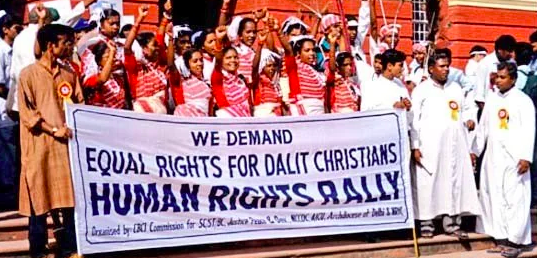Dalit Christians in Purathakudi still discriminated in processions
Despite a high court ruling that Dalit Christians must be able to participate in religious festivals together with non-Dalits, this year’s procession for the festival of St Francis Xavier will not pass by their homes. “Dalit Christians have fought to obtain their rights within the Church,” said Fr Bosco, SJ, speaking to AsiaNews. “Christians cannot accept castes.” In fact, "If he wants, the bishop can cancel festivals until people agree to get together to celebrate them.”
Trichy (AsiaNews) – A group of Dalit[*] Christians in the Purathakudi-Magizhambadi panchayat, Trichy district (Tamil Nadu), have complained about caste discrimination by non-Dalit co-religionists at the St Francis Xavier parish church, this despite a 2015 high court order allowing them to participate in church activities, including the annual festival.
The local parish comes under the Diocese of Kumbakonam and serves about 3,000 households, half of them Dalits and half non-Dalits. Dalit Christians complain that they have been excluded from the church's annual festival.
“During the celebration, no flag, torchlight, or car processions are carried out in our streets. The dominant Christians do not allow us to touch cars or adorn them with garlands,” some local Dalits said.
"We are completely ignored in all religious and cultural activities of our church. Even after the peace committee met 14 times, there was no consensus to let Dalits participate in the processions," they explained.
The local festival falls on 3 December. After the court's ruling in 2016, it was celebrated by Dalit and non-Dalits only in 2017.
The Madurai bench of the High Court this year again ordered the authorities, the bishop of Kumbakonam and the parish priest to take the most appropriate steps to involve Dalits in the annual festival.
The top clergy “has taken a stand in favour of the dominant Christians,” Dalits lament, a charge non-Dalit Christians reject, saying that logistical factors explain why the procession avoided some areas.
Father R Arockiadoss, vicar forane in the Lalgudi area, said the diocese is ready to implement the high court's decision. “Our bishop did his best to bring both groups together to organise the car procession."
"Although the Madurai bench of the Madras High Court ordered to take the car procession in Dalit streets, this has not been done yet,” said Fr Raj, former national secretary of the Office for Schedule Castes & Backward Classes (SC/BC) of the Catholic Bishops' Conference of India (CBCI).
“The excuse is that Dalit streets are too narrow to take the car procession,” he noted, “but everyone ought to come together with Christian faith and charity and resolve the issue."
Fr A.X.J. Bosco, SJ, has been active for many years in raising awareness within the Indian Church about this issue.
“Dalit Christians have fought to obtain their rights within the Church,” he said. “Purathakudi is an example of this. Christians cannot accept castes. Dalits are equal to others.”
“Although the Christian faith has always asserted that we are all children of God, many Christians in fact have always treated Dalits as untouchable and therefore unequal, with the silent support of bishops and priests, perpetuating the caste mindset.”
"If he wants," Fr Bosco explained, “the bishop can cancel festivals until people agree to get together to celebrate them. The official policy of the Catholic Bishops' Conference of India (CBCI) states that caste is a sin and caste discrimination is against Jesus and his principles.
“As long as the hierarchy and the priests continue to sin without even realising that they are sinning, Dalit Christians and Jesus, who ate and drank with sinners, Samaritans, outcasts and publicans have no place in the Indian Church.”
[*] Formerly known as pariahs or untouchables under India’s caste system.
05/02/2024 18:22







.png)










